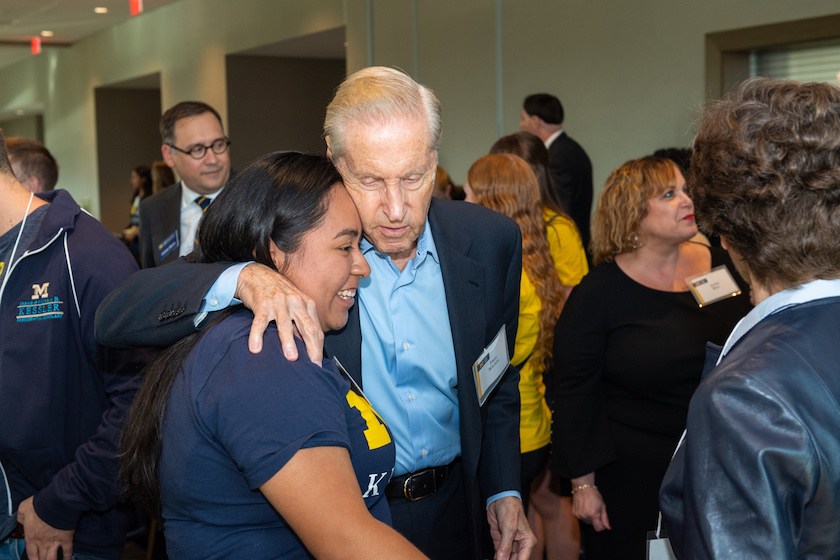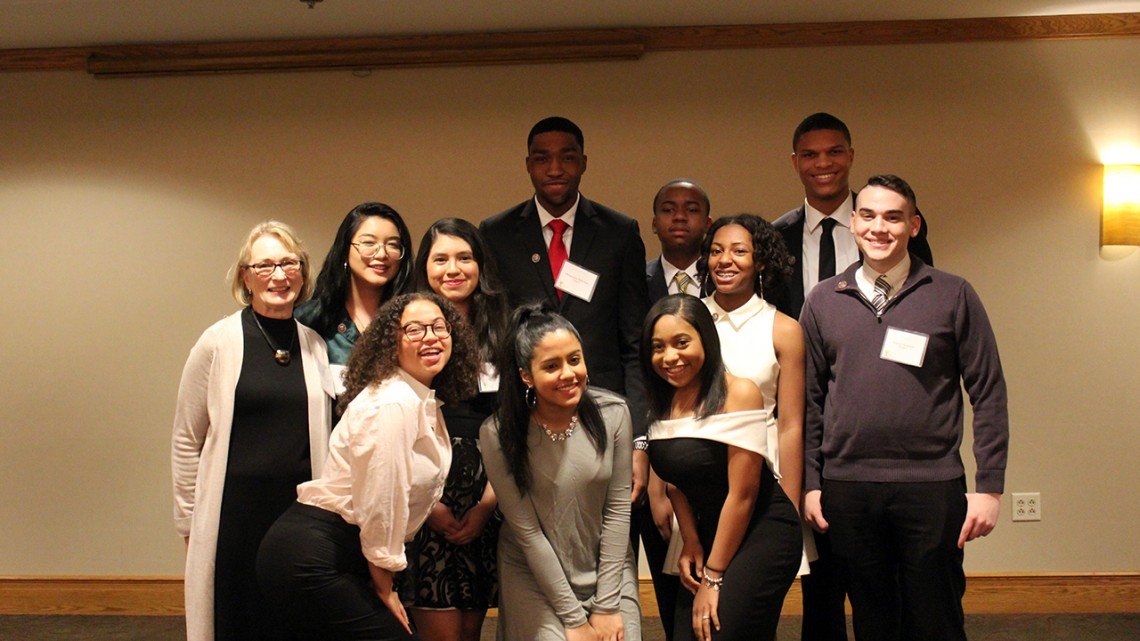To benefit first-generation students, Fred and Judy Wilpon—friends of Cornell who have given significant support and service to the College of Veterinary Medicine and the Baker Institute for Animal Health—have established an Irene and Morris B. Kessler Presidential Scholars Program at Cornell. Set to begin in fall 2019, the Kessler Scholars Program will identify 20 academically talented, community-focused undergraduates each year to participate in a multi-tiered system of support, community, and financial aid, administered by Student and Campus life, through the Dean of Students Office.
The program, named after Judy Wilpon’s parents, is modeled after the Kessler Presidential Scholarship established by the Wilpons at the University of Michigan in 2007. (The Kessler Presidential Scholars Program at Cornell is distinct from and unrelated to the Kessler Fellows Program for entrepreneurship in the College of Engineering, established by Andrew J. Kessler ’80 in 2008).

“The Kessler Presidential Scholarship takes a unique approach to supporting first-generation students with financial aid, guidance services, and a cohort community,” said Cornell President Martha E. Pollack. “I am so impressed with this program and with Fred and Judy Wilpon’s deep personal commitment to making higher education fully accessible for first-generation students.”
The gift advances diversity and inclusion priorities set by Ryan Lombardi, vice president for Student and Campus Life.
“This is the perfect time for such a vision to take deeper root at Cornell,” said Pollack. “As we increase our commitment to first-generation students and their experience, the Kessler Scholars Program offers an incredible opportunity to give a cohort of talented, engagement-minded students the tools and support to help them thrive at this university.”
A model to follow
The University of Michigan College of Literature, Science and the Arts established its Kessler Presidential Scholars program in the 2008-2009 academic year with a cohort of 15 students. Now the program supports 160 undergraduate students across all four years with an incoming class of 36. There are now 130 Kessler Scholar alumni.
The program has evolved in ten years, said Gail Gibson, director of the Kessler Presidential Scholars program at the University of Michigan. In the early years, it was a traditional scholarship for students who demonstrated financial need. In the past two years, however, the program has grown to include “wrap-around support” and build a cohort community on campus for low-income and first-generation students, all in collaboration with the Wilpons and their vision.
Being a Kessler Scholar defined the college experience for Erica Gonzalez-Paramo, who will graduate in 2019 from the University of Michigan with a B.S. in economics and a minor in business and mathematics.
“From professionalism workshops to study tables, social events, and career planning, they have guided me through the stressful times, something I would not have been able to do [otherwise] as a first-generation student,” she said. “Many of us first-gens come to university hoping and expecting to do well, but soon after setting foot on campus we realize the playing field is not even. What Kessler Scholars has done is provide the resources and support to ‘play the game.’”

Cornell establishing a Kessler Presidential Scholars Program is great news for exceptional students who are the first in their family to go to college, said University of Michigan President Mark Schlissel: “We’re proud that the comprehensive, cohort-based scholarship approach that the Wilpons started here at the University of Michigan is now a national model that is helping first-generation students thrive in college at Cornell and beyond.”
A good fit at the perfect time
During the past ten years, Cornell has been investing heavily in diversifying its student body, said Vijay Pendakur, dean of students. These advancements are based on the university’s historic commitment to access for “any person … any study” established by co-founder Ezra Cornell.
“As a university, we have to commit to fully supporting and empowering all of the students that we admit, particularly those from marginalized and vulnerable populations,” said Pendakur. “The Kessler Presidential Scholars Program fits this model seamlessly, as it represents a big step forward in the full inclusion of first-generation students by providing us the resources to support them financially, socially, and educationally to truly thrive in their time at Cornell.”
Kessler Presidential Scholars—numbering 20 each year during a four-year pilot phase at Cornell—will advance through their undergraduate years in a supportive community, said Shakima Clency, associate dean and director of First-Generation and Low-Income Student Support.
“Having that cohort will foster a sense of belonging and will make students feel connected to one another and to Cornell,” she said.
The scholars will also complete service projects, experience special trips to connect with unique places and talented people, and receive financial support; the summer savings expectation will be covered for Kessler Presidential Scholars.
This is the perfect time for such a vision to take deeper root at Cornell. As we increase our commitment to first-generation students and their experience, the Kessler Scholars Program offers an incredible opportunity to give a cohort of talented, engagement-minded students the tools and support to help them thrive at this university.
The Kessler Presidential Scholars Program reflects Cornell’s values, said Marla Love, senior associate dean for Diversity and Equity. “The scholars program is a good fit because it mirrors Cornell’s commitment to providing access to education for students of all backgrounds with diverse pathways to higher education,” she said.
A dream for expansion
As the program at Cornell matures, the two universities will collaborate toward fulfilling the Wilpons’ vision of a new model for first-generation college education.
“The dream is that ultimately, we would be able to bring programs like this across the country,” said Fred Wilpon, who was a first-generation college student himself. He entered the University of Michigan in the 1950s on a baseball scholarship, but he finished college—and thrived during and after—thanks to the guidance of a knowledgeable mentor and to lasting friendships with fellow students. This combination of support and community, he discovered, is key to the success of academically talented first-generation students. Now the chairman and CEO of the New York Mets, as well as a real estate developer, Wilpon is passionate about helping current students through struggles and triumphs similar to those he faced as the first in his family to attend college.
Fred Van Sickle, vice president for Alumni Affairs and Development, said he is grateful to the Wilpons for sharing their vision with Cornell and making the Kessler Scholars possible here. “Their longtime commitment to the university’s College of Veterinary Medicine has been essential, and we now welcome their innovative support for first-generation undergraduates,” he said. “I look forward to seeing class after class of Kessler Presidential Scholars graduate and form a powerful community of alumni with a special connection to Cornell.”
They haven’t even applied to Cornell yet, but the first 20 Kessler Presidential Scholars at Cornell, Class of 2023, already have some advice from one of their own, University of Michigan Kessler Scholar Gonzalez-Paramo: “Know that you are deserving of this opportunity,” she said. “Take advantage of all the resources, and do not be afraid to reach out to Kessler Scholars for help. University is overwhelming, but know that you don’t have to face the challenge alone.”





